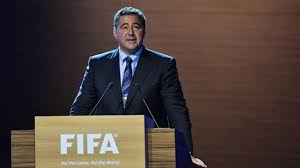By Andrew Warshaw
October 21 – Domenico Scala, the increasingly influential official who has the ultimate say in who can and can’t run for FIFA president, has delivered a potentially fatal blow to Michel Platini’s hopes of taking over from Sepp Blatter at the end of February in the event the Frenchman’s 90-day suspension is lifted.
On the same day that FIFA agreed for its strict ethics rules on confidentiality to be relaxed, Scala, FIFA’s independent audit and compliance supremo, issued a damning indictment of the reasons given so far by both Blatter and Platini to justify the notorious SFr 2 million transaction that led to both being provisionally sanctioned.
In a wide-ranging interview with the Financial Times, Scala said the fact there was no written agreement between the pair was only part of the problem and that the non-declaration of the payment was a “serious omission”.
“The key points are a conflict of interest and the non-accrual of the 2 million in FIFA’s accounts,” said Scala. ” Both parties admit an agreement over the 2 million, but that amount was never recorded in FIFA’s account until the payment occurred.”
“That is a serious omission. Both parties were members of FIFA’s Executive Committee approving every year knowingly the financial statements, which were incorrect by 2 millio. That could be seen as falsification of the accounts.”
“One explanation I have seen is that FIFA was not in a position to pay. Another is that it was not paid at the time because it would have been more than the secretary general (at the time Michel zen Ruffinen) was paid. Both explanations are irrelevant. What is overlooked is that both parties in that transaction were members of FIFA’s executive committee when that payment occurred. So both had a conflict of interest and should have recused themselves from that decision.”
Scala, one of whose roles is helping to reform the scandal-hit organisation, also called for a rotating FIFA presidency – a move he says would help stop all the wheeling and dealing, be good for democracy among the six confederations and restore transparency.
His view would doubtless be challenged by confederations that have a larger membership and more commercial influence but Scala said: “Why do we need to focus on one person who would lead FIFA for the next eight or 12 years, whatever the term limits are? Why not have a presidency which rotates every four years?
“Presidents could be nominated by the six confederations. Each confederation would have the right to have a president for, say, four years. Such as model is used in other institutions – the European Union, for example. It would, I think, address a number of governance issues.”
“[This] would diminish the power of an individual president [and] every system which diminishes the powers of individuals and creates checks and balances reduces the risk of misconduct.”
“Such a reform would mean a fairer representation of the confederations and the different regions of the world. Why should a European run FIFA for the next 12 years?”
Rotation, said Scala, would also “help eliminate the ‘old boys network’ and better represent the diversity of football worldwide.”
Scala also hinted in the FT interview that the proposals presented by Reform Committee chairman Francois Carrard to Tuesday’s exco meeting did not go far enough. Term and age limits, for instance, only apply to the FIFA president and not the hierarchy below. It is understood this was brought to Carrard’s attention and highlights once again the questionable make-up of his committee which largely consists of confederation representatives with vested interests. It is believed the proposals might be tweaked before the final session of the exco in early December before the reforms go forward for approval at the February 26 election.
Scala has already put forward his own more robust set of ideas. “I have proposed executive committee members should be elected directly by the FIFA congress. When they are sent by confederations, you can question their accountability and loyalty towards the FIFA organisation. Direct election by congress would increase their accountability.”
“Term limits and integrity checks are important … but the main proposal in my reform paper is the reform of the executive committee to create governing board and management board. This would split oversight and strategy from commercial activities and day-to-day activities. Because FIFA officials today have two or three responsibilities, there are inevitably conflicts of interest.”
Contact the writer of this story at moc.l1751591988labto1751591988ofdlr1751591988owdis1751591988ni@wa1751591988hsraw1751591988.werd1751591988na1751591988

